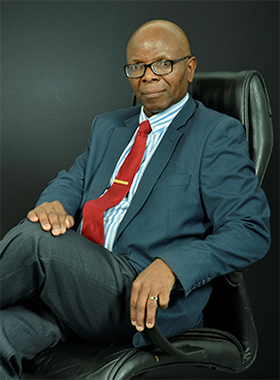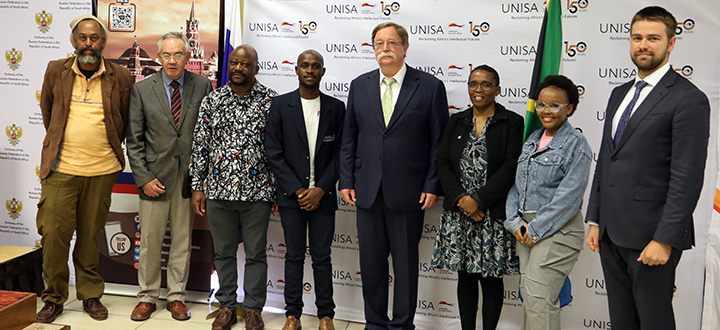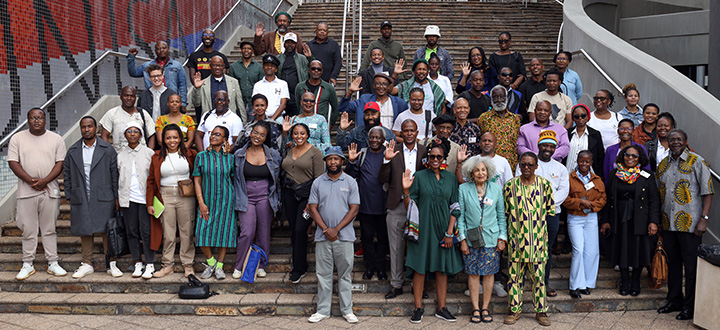College of Agriculture & Environmental Sciences
Determination and hard work pay for Dr Monde Nyila

Dr Monde Nyila
Dr Monde Nyila is a senior lecturer in Unisa's Department of Life and Consumer Sciences who was recently appointed as a country ambassador to South Africa by the American Society for Microbiology (ASM). Country ambassadors are senior scientists who represent ASM in their home country, facilitating partnerships and exchange with other scientists worldwide.
Congratulating Nyila on his appointment, Principal and Vice-Chancellor, Prof Mandla Makhanya, said: "It was with great pleasure that I learned of Dr Nyila’s appointment as a country ambassador to South Africa by the ASM. We look forward to the role he will play, not only in fulfilling an ambassadorial role for the ASM, but also in promoting the name of South Africa and Unisa in the crucial growing field of science. We look forward to hearing good things from this appointment."
Dr Monde Nyila spoke to the news team about his academic career, his passion for the microbial sciences, and how he sees his new ambassadorial role.
Briefly tell us about the American Society for Microbiology.
The American Society of Microbiology (ASM) is the oldest and largest single prestigious life science society in the world. ASM was founded in 1899 with a membership of 59 scientists. It has now grown to over 45 000 members, of which more than 50% live outside the USA. ASM’s mission is to promote and advance the microbial science by the following:
- Providing a platform for sharing the latest discoveries through ASM’s books, journals, meetings and conferences.
- ASM helps to strengthen sustainable health systems around the world through its laboratory capacity building as well as its global engagement programmes.
- ASM advances careers through its professional development programmes and certifications.
- ASM trains and stimulates the next generation of scientists through its outreach and educational programmes.
You can read more on the ASM website.
How did you get appointed as the ASM Country Ambassador to SA?
In 2018, I applied online to the ASM to be the country ambassador to SA after I saw the call on the ASM website.
In my letter of intent, I had to describe why I was interested in becoming the ASM ambassador to my country, as well as the skills and experience that make me a strong candidate.
In the action plan, I was asked to outline a brief action plan with proposed activities to accomplish the roles of a country ambassador, and to provide as much detail as possible including relevant events, target universities and scientific organisations. The ASM was interested in my approach and ideas towards accomplishing the tasks of being an ASM country ambassador.
In the letter of intent, I wrote that I am a senior lecturer at the University of South Africa and responsible for teaching undergraduate in Microbiology and doing research in microbiology as well as students supervision. I highlighted my recent book I edited, Listeria monocytogenes, published by IntechOpen, United Kingdom, available online. All my contributions with regard to teaching and research (including all my publications) in the field of microbial science (microbiology), as well as my experience in microbial science, were detailed in the letter of intent. The selection committee acknowledged my expertise, experience and skills and my promotion of the microbial sciences.
What will be your role and responsibility in the position?
My role and responsibility as the ASM Country Ambassador is as follows:
- To advance microbiological science in the South African scientific community and the region as a whole. I will contact scientific organisations such as the South African Council for Natural Scientific Professions (SACNASP) and the South African Society of Microbiology (SASM) to introduce myself as the ASM country ambassador. I have already written to the secretary of the SASM to notify him of my appointment as the ASM country ambassador to SA.
- To promote and explain the benefits of membership of ASM.
- I will identify and communicate national/regional issues and opportunities to ASM.
- I will have to build relationships with nation/regional societies.
- To facilitate networking opportunities and /or contribute to national/regional Facebook groups of ASM.
- To provide local assistance for ASM programmes and projects when appropriate.
In order for me to carry on the above-mentioned roles and responsibility I will at the beginning of each year submit an annual work plan of activities planned for the year to ASM staff in Washington, DC, United States.
What does this appointment mean to you as an individual?
This prestigious appointment means a lot to me as an individual in that my stature in the microbiological scientific community has grown fast internationally, and my contribution as a scientist and scholar in advancing scientific knowledge and scholarship is internationally acclaimed.
I am excited and looking forward to raising the Unisa and SA flags in the international community. It is also a motivation to colleagues at Unisa that hard work, perseverance and passion can lead to greater achievement. This prestigious appointment is an indictment on all those people at the university that did not recognise the achievement of the individual who has been denied promotion four times over the years.
I did not give up my craft as a scientist and scholar when I did get not promotion and I told myself that one day the world will see my contribution and I have been vindicated by getting this international prestigious appointment. I join a growing network of 95 country ambassadors at the centre of ASM’s efforts to foster the dissemination and development of microbiological knowledge around the world.
How does this benefit your work at Unisa and Unisa as a university?
- One of the roles and responsibilities of the country ambassador is sharing ideas and experiences with their fellow country ambassadors in other countries. We can do joint research with our fellow scientists in Africa and other parts of the world, jointly hosting seminars, conferences and workshops for the advancement of fellow scientists in our respective institutions
- In strengthening ASM’s global network of members by participating in seminars, conferences, roadshows, training and mentoring of the researchers, students and communities, Unisa will benefit because I will be in position to drive the process from the Unisa side before I go out to other institutions. Already I have talked to colleagues who are interested to be members of the ASM. I will encourage the university to sponsor the membership/pay the membership fee of colleagues. Being a member of ASM has benefits to members by providing discount on conferences fees, journals, books, etc.
- Writing proposals jointly with fellow ASM global network members to source funding for research projects.
- Unisa scientists will be able to work with fellow ASM members in sister universities. As the country ambassador, I will source sponsorship from ASM headquarters in the US to host a seminar at Unisa and invite sister universities’ scientists to participate.
- During Unisa Research and Innovation Week we can have the participation of scholars invited by the ASM on behalf of the country ambassador.
- One of the responsibilities of the ASM country ambassadors is to identify and respond to the needs of their local microbiology community.
- As community engagement is one pillar of the university, I have identified a need to involve ASM as follows:
- Identify and assist ASM in responding to the needs of the local scientific community by visiting them, participating in activities that benefit the community.
- To get involved in the community engagement activities which involve the participation of the community in improving their well-being, for example, the promotion and awareness of hygiene especially with regard to the handling and storage of food to avoid food poisoning diseases caused by foodborne pathogens. Remember in 2017 and 2018 the outbreak of listeriosis in our country. There was the lack of information on how to handle the outbreak. Another example is use of waste in the production of the biogas (clean energy) in places where there is no electricity. This can be done by the introduction of bio-digesters.
How do you intend to use this opportunity to give back to the teaching and learning experience of your students and learning experience at Unisa?
One of the responsibilities of the ASM country ambassador is to promote the ASM membership throughout their region.
I will be exposing Unisa students to the activities of ASM. I will apply for a Country Ambassador Project Fund for the following activities:
- Public outreach activities or science promotional activities with young students.
- Awarding of student prizes/promotion at local scientific meetings
Our microbiology students will be encouraged to take ASM membership.
ASM membership provides students with travel awards, reduced rates for participating in meetings, workshops and audio conferences, listing of research grants and funding opportunities, listing of internet resources available for microbiologists, education materials and more.
Post-doctoral Unisa students would be able to receive career resources and mentoring for sciences teaching positions.
Please tell us about your educational background.
I was born and bred in the Free State province capital, Bloemfontein. I did primary education at Ikhwezi Lower Primary School (now known as Nozala) and at Ihobe Intermediate School. I did my secondary education at Vulamasango. I went further and studied for BSc, majoring in Microbiology and Biochemistry at the University of the Western Cape (UWC) in the 1980s as well as a BSc Honours in Microbiology at UWC.
I was intrigued and excited by the world of microbes when I was in my second year of my Microbiology class. At the BSc honours level I did a project on the foodborne pathogen, Listeria monocytogenes and my research topic was "Stress factors which affect the growth of the foodborne pathogen, Listeria monocytogenes". That was the first time I was introduced to the microbial science research.
After I completed my BSc Honours, I went to look for work and I ended up being a teacher from 1992 until January 2003. During that period I enrolled for HED (Postgraduate) at Unisa. In 2001, I studied for my MSc at Rhodes University and in February 2003 I joined Vista University Distance Education Campus (VUDEC) before the merger of Unisa and Technikon South Africa (TSA) and the incorporation of VUDEC which took place in January 2004.
At VUDEC, I was in the Department of Biological Sciences. Since then, I was a Unisan in the College of Agriculture and Environmental Sciences (CAES). I was in the Department of Life Sciences, which was merged with Consumer Science in 2006 to form the Department of Life and Consumer Sciences. I was the only black (African) person in the Department of Life and Consumer Sciences for two years (2005 to 2006) and I was not satisfied with the situation and I challenged the status quo and now the Department of Life and Consumer Sciences is a diverse department in CAES. I enrolled for a PhD at the University of Pretoria and my research project was on Listeria monocytogenes and the South African medicinal plants activity against the foodborne pathogen.
I studied the anti-listerial activity of South African medicinal plants against L. monocytogenes. I isolated compounds that showed activity against the pathogen. I presented my research at local and international conferences. I graduated in April 2011. I am presently a Senior Lecturer at Unisa.
In 2018 I edited a book, Listeria monocytogenes which was published in August 2018. The book was well received by microbial scientists around the world, especially in the United States, Europe, and Asia. In November 2018, I attended a conference in Stiges, Barcelona in Spain, the 14th International Conference on Molecular Epidemiology and Evolutionary Genetics of Infectious Diseases. My topic presented at the conferences was ‘Recent challenges posed by the outbreak of listeriosis in South Africa: Lessons from this incidence’.
I have been at Unisa for over fifteen years and I contributed immensely over the years to the institution.
I am dedicated to my work and value the service I give to our students. I have mentored colleagues who joined the department. The international recognition I have received from my peers around the world in microbial science (microbiology) is a clear indication that hard work and dedication to one’s craft and career does not depend on the favours. Even if you are not recognised in your own institution keep on working hard and the world will be oyster.
Any information you’d like to share about this opportunity?
I would like to thank my wife. She has been a pillar of strength and support. She keeps me on my toes and tells me every time not to rest on my laurels and keep on working hard. I would not have achieved this prestigious ASM country ambassador to South Africa appointment if she was not there.
My daughter and son look up to me as their role model. My whole family has always supported me in my ups and downs. I am very grateful for this exciting significant appointment. I would like to thank mentors who contributed to my growth as a scholar and scientist of international stature. I thank Unisa for affording me the platform to grow and explore.
* Interview by Tshimangadzo Mphaphuli, Senior Journalist, Department of Institutional Advancement
Publish date: 2019-03-28 00:00:00.0

 Unisa's student leadership engage with Russian ambassador
Unisa's student leadership engage with Russian ambassador
 Re-igniting and re-imagining Pan Africanism, Afrocentricity and Afrofuturism in the 21st century
Re-igniting and re-imagining Pan Africanism, Afrocentricity and Afrofuturism in the 21st century
 Young Unisa science stars join elite Lindau Nobel Laureate group
Young Unisa science stars join elite Lindau Nobel Laureate group
 Education MEC addresses Unisa autism seminar
Education MEC addresses Unisa autism seminar
 Seven Unisans nominated for the NSTF-South32 Awards 2023/2024
Seven Unisans nominated for the NSTF-South32 Awards 2023/2024